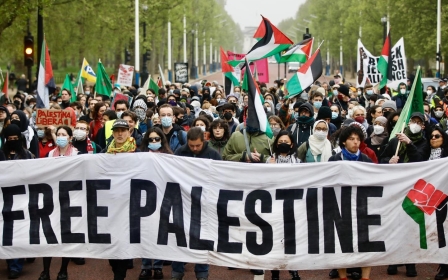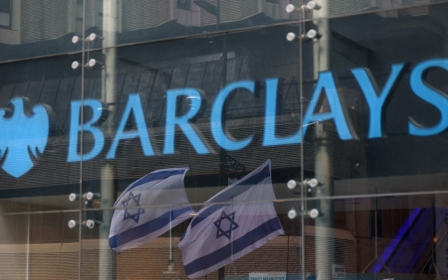War on Gaza: UK holds firm on arms exports to Israel after Biden threatens halt

British Foreign Secretary David Cameron has said the United Kingdom will not halt arms sales to Israel, a day after President Joe Biden threatened to stop sending some US weapons if Israel stages a large-scale assault on Rafah.
Cameron said there was "a very fundamental difference" between the US government, which supplies weapons directly as a state to Israel, and the UK government, which licenses the export of arms sold by companies.
"We do not have a UK government supply of weapons to Israel," Cameron said, adding he thought UK defence exports to Israel were "responsible for significantly less than one percent of their total".
Katie Fallon, at the Campaign Against the Arms Trade (Caat), said Cameron’s comments show "absolutely no regard for the survival of Palestinians in Gaza or for the rule of law in the UK".
"It is beyond alarming, and unlawful, that our foreign secretary and government think that the risk of genocide and war crimes are simply irrelevant in their decision to license UK-made arms and components to Israel for use in Gaza," she told Middle East Eye.
Stay informed with MEE's newsletters
Sign up to get the latest alerts, insights and analysis, starting with Turkey Unpacked
Cameron's comments come a day after MPs pressed Prime Minister Rishi Sunak to follow the US, which paused a shipment of bombs to Israel last week amid concerns about an invasion into southern Gaza's Rafah, where 1.4 million Palestinians are sheltering.
"It's been reported that the United States has paused an armed shipment to Israel. The UK will now follow suit, won't it?" Scottish National Party MP Stephen Flynn said in parliament.
In response, Sunak said: "The right honourable gentleman may not realise, but the UK government doesn't itself directly provide arms or ship arms to Israel."
Sunak went on to acknowledge that the UK government licenses the export of arms to Israel, which he said it took "extremely seriously" and has "one of the most robust licensing regimes anywhere else in the world".
Licences of concern
The government drew similar distinctions when asked tough questions about UK arms exports to Israel in February.
That month, eight rights groups asked it to clarify how it knew that British-made weapons had not been delivered to Israel since the 7 October Hamas-led attack, as the minister for armed forces had said in December.
In response, the government clarified that it had not itself sent weapons directly to Israel, but then declined to say whether it had revoked 28 current licences and 28 pending applications for the export of equipment that a Foreign Office assessment flagged soon after 7 October as "most likely to be used by the [Israeli army] in offensive operations in Gaza".
The assessment was noted in an affidavit filed by the Department for Business and Trade at the High Court earlier this year, in response to a legal challenge brought by Palestinian human rights organisation Al-Haq and the UK-based Global Legal Action Network (GLAN).
The current licences cover the export of components for combat aircraft, armoured personnel carriers and targeting equipment.
On 9 April, Cameron announced, in response to a reporter’s question during a news conference in Washington, that UK arms sales would continue to be licensed based on the government's latest assessment, presumably leaving the 28 licences of concern in place.
Since the announcement, government documents filed in the High Court challenge have revealed that the government took that decision based on assessments that did not factor in the Israeli attack on the World Central Kitchen convoy, which killed three British nationals just a week before.
Government officials have repeatedly emphasised in recent months that UK defence exports to Israel were very small. In 2023, Defence Secretary Grant Shapps said such exports were "just £42m ($53m) last year".
Anti-arms campaigners have said that the true figure could be much higher, because the items sold under opaque open licences keep the value of arms and their quantities secret.
They also point to how critical UK-made components may be to Israel's war effort. According to Caat, British companies provide around 15 percent of the components of the F35 stealth combat aircraft that Israel has used to bomb Gaza.
It also believes that the real value of arms exports to Israel is twice as high as the government claims it is, reaching at least £1bn ($1.3bn) since 2015.
Fallon said: "F-35 jets that have been dropping bombs on Gaza for the last seven months would not be in the sky without the components made all across the UK."
Middle East Eye delivers independent and unrivalled coverage and analysis of the Middle East, North Africa and beyond. To learn more about republishing this content and the associated fees, please fill out this form. More about MEE can be found here.





